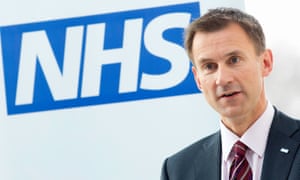
Mental health campaigners have welcomed a government plan to roll back years of service cuts that have caused “dangerously high” bed occupancy rates, waiting times and low staff retention.
However, the Royal College of Nursing (RCN has said the government’s proposals “appear not to add up”.
The announcement of the government’s NHS expansion plan for mental health services puts flesh on the bones of a pledge announced by Theresa May seven months ago, when the prime minister promised to tackle the “burning injustice of mental illness”.
Jeremy Hunt, the health secretary, said 21,000 new posts would be created at a cost of £1.3bn, with more trained nurses, therapists, psychiatrists, peer support workers and other mental health professionals. A major drive to retrain and retain mental health staff would be put into place, he said.
The plan aims to treat an extra 1 million people by 2021, provide mental health services seven days a week, 24 hours a day, and properly integrate mental and physical health services.
“As we embark on one of the biggest expansions of mental health services in Europe it is crucial we have the right people in post – that’s why we’re supporting those already in the profession to stay and giving incentives to those considering a career in mental health,” said Hunt. “These measures are ambitious, but essential for delivering the high performing and well-resourced mental health services we all want to see.”
The RCN has questioned whether there was sufficient time and funding to train enough new professionals to meet the ambition of the policy. Janet Davies, the RCN’s chief executive, said if the proposed nurses were to be trained in time they would have to begin within weeks.
“The government’s policies appear not to add up,” she said. “It is clear the government will need to work hard just to get back to the number of specialist staff working in mental health services in 2010. Under this government, there are 5,000 fewer mental health nurses and that goes some way to explaining why patients are being failed. The NHSneeds to see hard cash to deliver any plans.”
Asked on BBC1’s Breakfast programme about Davies’s views, Hunt argued that as well as extra money, the mental health services needed more personnel, saying his plans would bring an extra 2,000 staff for children and young people’s mental health, and more for crisis care.
Hunt defended the continued pay rise cap for nurses, saying this was in part why the government could afford to recruit more people. “It is a very tough job, and I would say that nurses on the front line have never worked harder,” Hunt said.
“But we are expanding the nursing workforce: we have nearly 6,000 more nurses on the front line than we had in 2010. We want to expand it further. One of the reasons we have been able to expand the workforce to date is because, with a limited budget and a very difficult economic situation, we have shown pay discipline.
“We have to balance that against the need for recruitment, to keep people in nursing. That’s why we have this independent process with the pay review body. That’s why we will listen carefully to what the pay review body says before we make our final decision.”
The announcement comes after a series of dire warnings from those researching and working in the mental health sector. In early July, NHS mental health trust bosses said services were so overwhelmed by soaring demand that patients were facing long delays to access care.
Last week, research from the Education Policy Institute thinktank revealed that children with serious mental health problems were becoming trapped in NHS psychiatric units, unable to leave because care was unavailable outside hospitals.
The increase in mental nursing posts – 4,600 will be added in crisis care settings with an unspecified number of further posts in child and adolescent services – comes after a steep decline since the Conservatives came to power in 2010. By November last year, the number of mental health nurses working in the NHS had dropped by almost a sixth – a fall of 6,610 nurses in England, almost 15% of the entire workforce.
The government said child and adolescent services would see 2,000 additional nurses, consultants and therapists, while 2,900 extra therapists and other health professionals would be involved in adult talking therapies.
The chief executive of the mental health charity Mind, Paul Farmer, said the plan was welcome but the success of the NHS’s plan for improving mental health services between now and 2021 depended heavily on the capacity and quality of the workforce.
“A damaging lack of foresight in workforce planning in the past has led us to where we are now, with a significant gulf between what’s in place and what’s needed to deliver good quality care,” he said.
“Cuts to mental health services in recent years have led directly to posts being axed and have taken their toll on morale, which has led to valued staff leaving mental health in frustration or burn-out. The scale of the challenge is clear, so we welcome the measures announced in this plan to attract people back to mental health and keep hold of them,” Farmer added.
Dr Gary Wannan, the BMA consultants committee deputy chair, said: “Mental health provision has been historically underfunded, so commitments to bring […] psychiatric services into line with physical health are welcome, but as we’ve seen from recent CQC reports and our own research into out-of-area placements, bed occupancy rates are dangerously high and some buildings and estates in mental health trusts are entirely unfit for purpose.”
Source:-theguardian



